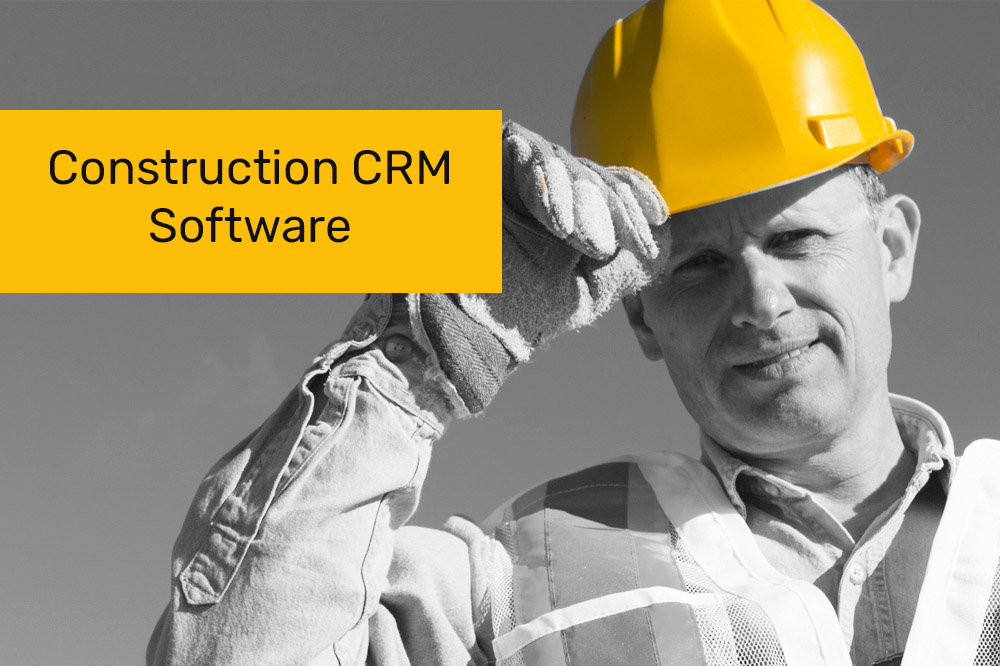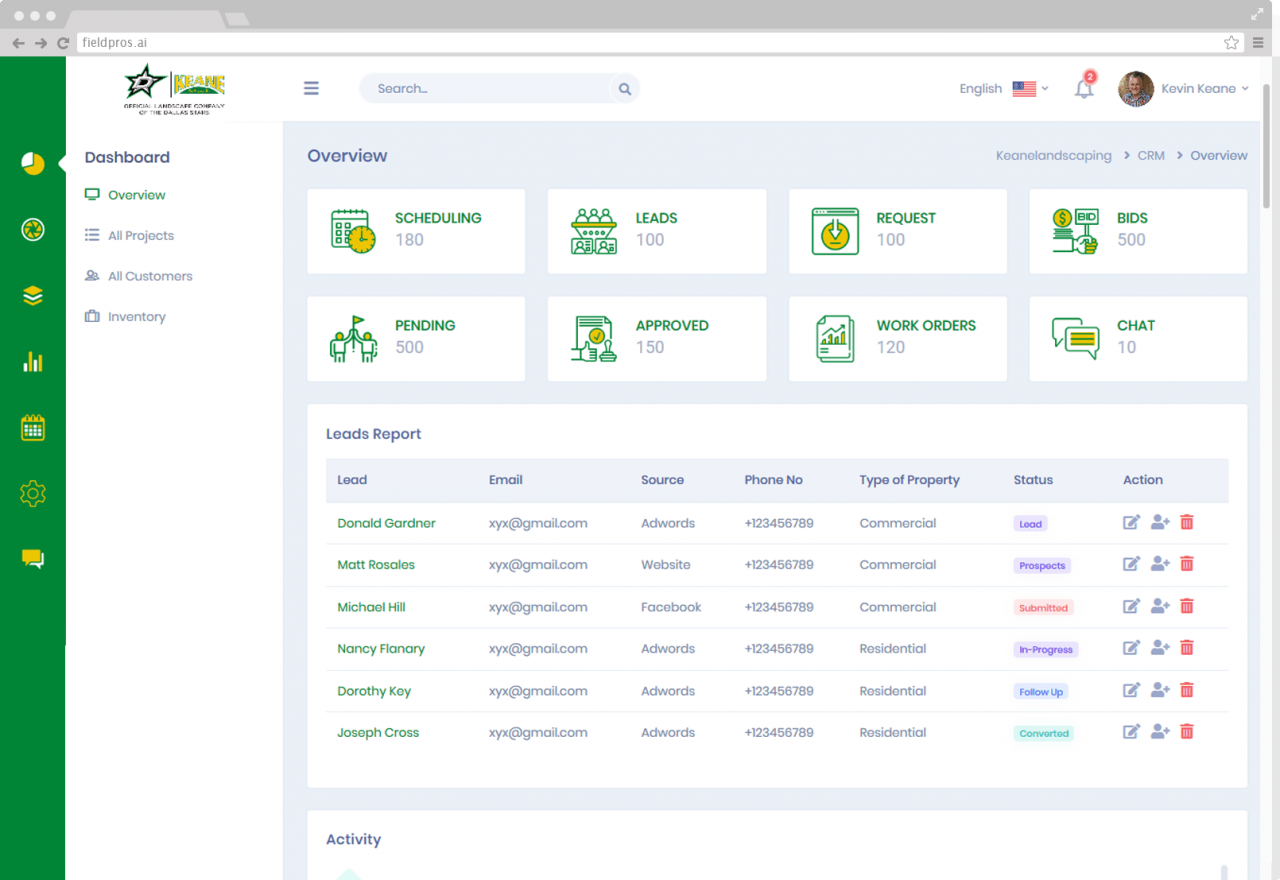With CRM software construction taking center stage, we delve into a realm where efficiency, collaboration, and profitability soar. This transformative technology streamlines construction operations, empowering businesses to reach new heights of success.
CRM software for construction is not just a tool; it’s a catalyst for growth and innovation. By harnessing its power, construction companies can gain a competitive edge and establish themselves as industry leaders.
Key Features of CRM Software for Construction
Construction-specific CRM software offers robust capabilities tailored to streamline operations and enhance customer relationships. These features include:
Project Management
CRM software integrates project management tools, enabling construction companies to track progress, manage resources, and collaborate effectively. It provides real-time updates, task assignments, and document sharing, ensuring seamless project execution.
Lead Generation
CRM software assists in identifying and qualifying potential clients. It automates lead capture from various sources, such as websites, social media, and industry events. By nurturing leads through targeted marketing campaigns, construction companies can increase conversion rates and grow their customer base.
Customer Relationship Management
CRM software fosters strong customer relationships by centralizing communication channels. It provides a comprehensive view of customer interactions, allowing construction companies to track project history, resolve queries promptly, and deliver exceptional customer service.
Benefits of Using CRM Software in Construction

Implementing CRM software in construction companies offers a myriad of advantages. These include improved efficiency, enhanced collaboration, and increased profitability.
Improved Efficiency, Crm software construction
CRM software streamlines construction processes, reducing manual tasks and eliminating redundancies. Automated workflows and centralized data management save time and resources, enabling teams to focus on high-value activities.
Enhanced Collaboration
CRM software facilitates seamless collaboration among project teams, contractors, and clients. Shared access to real-time project data improves communication, reduces misunderstandings, and ensures everyone is on the same page.
Increased Profitability
By improving efficiency and collaboration, CRM software helps construction companies reduce costs and increase revenue. Better project management, improved customer relationships, and enhanced decision-making contribute to higher profitability.
Case Study: ABC Construction
ABC Construction implemented a CRM software solution and experienced a 20% increase in project completion rates, a 15% reduction in project costs, and a 10% growth in revenue.
Types of CRM Software for Construction

Construction companies have a wide range of CRM software options available to them. These systems vary in terms of features, pricing, and target audience. To choose the right CRM software for your construction business, it’s important to understand the different types of systems available.
On-Premise CRM Software
On-premise CRM software is installed on your company’s own servers. This gives you complete control over the software and your data. However, on-premise CRM software can be expensive to purchase and maintain. It also requires a dedicated IT staff to manage the system.
Cloud-Based CRM Software
Cloud-based CRM software is hosted by a third-party provider. This means that you can access the software from anywhere with an internet connection. Cloud-based CRM software is typically more affordable than on-premise software, and it’s easier to maintain. However, you don’t have as much control over the software or your data.
Construction-Specific CRM Software
Construction-specific CRM software is designed specifically for the needs of construction companies. These systems typically include features such as project management, contact management, and lead tracking. Construction-specific CRM software can be more expensive than general-purpose CRM software, but it can also provide a number of benefits for construction companies.
| Feature | On-Premise CRM Software | Cloud-Based CRM Software | Construction-Specific CRM Software |
|---|---|---|---|
| Cost | High | Low | Medium |
| Control | High | Low | Medium |
| Flexibility | Low | High | Medium |
| Ease of Use | Medium | High | High |
| Target Audience | Large construction companies | Small and medium-sized construction companies | Construction companies of all sizes |
When choosing a CRM software for your construction business, it’s important to consider your company’s specific needs. If you need a high level of control over your software and data, then on-premise CRM software may be the best option for you.
If you’re looking for a more affordable and easy-to-use solution, then cloud-based CRM software may be a better choice. And if you need a CRM software that’s specifically designed for the needs of construction companies, then construction-specific CRM software is the best option.
Implementation and Integration of CRM Software

The successful implementation of CRM software in construction companies is crucial to maximize its benefits. It involves careful planning, data migration, user training, and integration with existing systems.
Here’s a step-by-step guide to ensure a smooth implementation process:
Step 1: Planning and Assessment
- Define clear goals and objectives for CRM implementation.
- Assess current business processes and identify areas for improvement.
- Choose a CRM software that aligns with your specific needs and requirements.
Step 2: Data Migration
Migrate data from existing systems, such as spreadsheets or legacy CRM systems, into the new CRM software.
- Ensure data accuracy and completeness before migration.
- Establish data mapping and conversion rules to maintain data integrity.
Step 3: User Training and Adoption
Provide comprehensive training to users on the CRM software’s functionality and best practices.
- Develop user manuals and training materials.
- Conduct hands-on workshops and simulations.
- Encourage user feedback and support to ensure adoption.
Step 4: Integration with Existing Systems
Integrate the CRM software with other business systems, such as project management software, accounting systems, and email platforms.
- Use APIs or connectors to establish seamless data flow.
- Ensure data synchronization and avoid duplicate data entry.
Best Practices for Successful Implementation
- Establish a dedicated implementation team with clear roles and responsibilities.
- Set realistic timelines and milestones for each implementation phase.
- Continuously monitor progress and make adjustments as needed.
- Provide ongoing support and training to users after implementation.
Challenges and Solutions for CRM Software in Construction
CRM software adoption in construction poses unique challenges due to the industry’s specific complexities. Addressing these challenges is crucial for optimizing CRM software usage and realizing its full potential.
Data Accuracy
Maintaining accurate and up-to-date customer data is critical for effective CRM usage. Challenges arise from dispersed project sites, multiple stakeholders, and frequent changes in project details.
Solutions:
- Centralized Data Management:Establish a central repository for customer information, accessible to all authorized personnel.
- Regular Data Verification:Implement processes for regular data validation and cleansing to ensure accuracy.
- Automated Data Capture:Integrate CRM software with other systems (e.g., project management software) to automate data collection and reduce manual errors.
User Adoption
Encouraging user adoption of CRM software is crucial for successful implementation. However, construction teams may face resistance due to unfamiliarity, time constraints, or perceived complexity.
Solutions:
- Training and Support:Provide comprehensive training and ongoing support to help users understand and navigate the CRM system.
- Tailored User Interfaces:Design user interfaces that align with the specific workflows and needs of construction professionals.
- Incentivize Usage:Offer incentives or recognition for active CRM usage to motivate adoption.
Customization
Construction projects vary significantly in size, complexity, and requirements. Standard CRM software may not fully meet the industry’s specific needs.
Solutions:
- Customizable Modules:Select CRM software that offers customizable modules or allows for the creation of custom fields and workflows.
- Industry-Specific Templates:Leverage pre-built templates designed for construction projects to streamline customization.
- Integration with Third-Party Apps:Integrate CRM software with third-party applications that cater to construction-specific requirements.
Future Trends in CRM Software for Construction: Crm Software Construction
The future of CRM software for construction is poised to be shaped by several emerging trends and innovations. These advancements will transform how construction companies manage customer relationships, streamline processes, and drive growth.
Artificial Intelligence (AI)
AI is revolutionizing the construction industry by automating tasks, improving data analysis, and enhancing decision-making. CRM software integrated with AI can analyze customer data, identify patterns, and provide personalized recommendations. This enables construction companies to better understand their customers’ needs and tailor their offerings accordingly.
Mobile Technology
The proliferation of mobile devices has made it essential for CRM software to be accessible on smartphones and tablets. Mobile-friendly CRM systems allow construction professionals to access customer information, update project details, and collaborate with team members on the go.
This improves productivity and enables real-time communication, regardless of location.
Cloud Computing
Cloud-based CRM software eliminates the need for on-premises infrastructure and provides access to data from anywhere with an internet connection. This scalability and flexibility make it an attractive option for construction companies of all sizes. Cloud CRM systems also enable seamless integration with other software and services, further streamlining operations.
Epilogue
As the construction industry continues to evolve, CRM software will remain at the forefront of innovation, driving efficiency, enhancing collaboration, and maximizing profitability. By embracing this technology, construction companies can unlock their full potential and shape the future of their industry.
Question Bank
What are the key features of CRM software for construction?
CRM software for construction typically includes features such as project management, lead generation, customer relationship management, document management, and reporting.
How can CRM software benefit construction companies?
CRM software can help construction companies improve efficiency, enhance collaboration, increase profitability, and gain a competitive edge.
What are the different types of CRM software for construction?
There are various types of CRM software for construction, including on-premise, cloud-based, and mobile-based solutions.
How can I implement CRM software in my construction company?
Implementing CRM software involves data migration, user training, and integration with existing systems. It’s recommended to follow a step-by-step approach to ensure a successful implementation.
